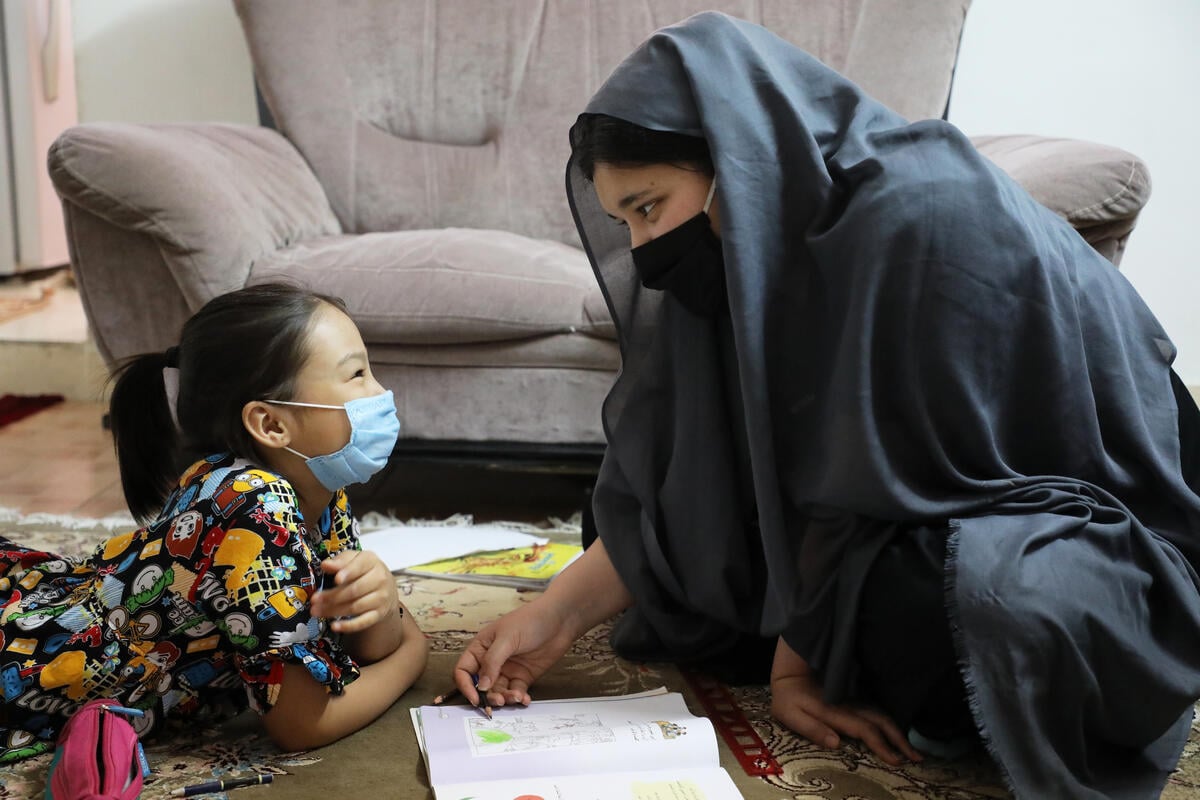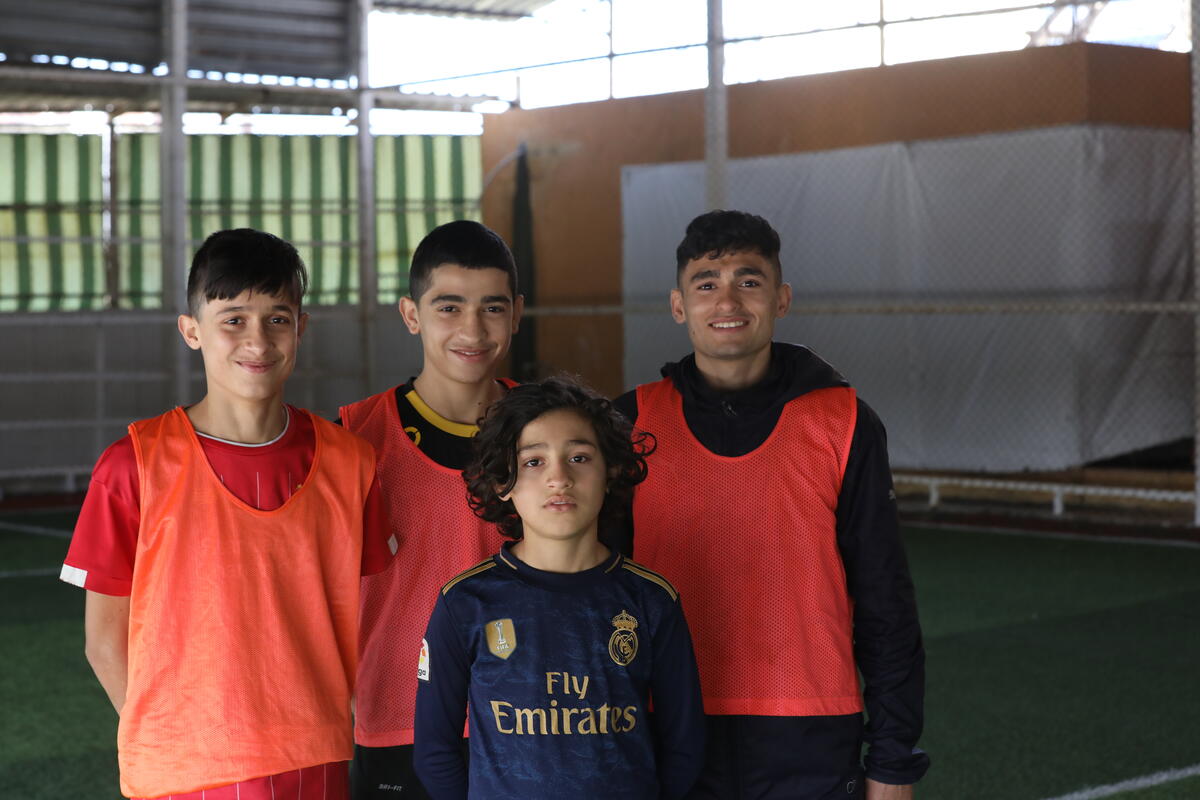Feature: Act now to avert HIV/AIDS epidemic in Somalia, says doctor
Feature: Act now to avert HIV/AIDS epidemic in Somalia, says doctor

BOSSASO, Somalia (UNHCR) - It's a lonely crusade Dr Abdinasir Mohamoud Abubakar has chosen for himself. Educated in Canada and the United States, he returned to his native Somalia to fight the uphill battle of raising awareness of HIV/AIDS, widely perceived here as being a foreign disease that doesn't threaten this country in the Horn of Africa.
"Somalia is on the verge of an explosion of HIV and AIDS unless we act now," warns Dr Abdinasir, one of the very few campaigners against HIV and AIDS in north-eastern Somalia, also known as Puntland.
Not only the general public, but most of Somalia's doctors, are still in the denial stage, he says. "Unfortunately, people don't recognise the threat. Somalis have a very conservative culture. People say this is a foreign disease. They think if you do get HIV, God is punishing you."
In fact, Somalis are at great risk. "If one percent of pregnant women test positive, it's an emergency," he says. "Puntland is now at 0.9 percent."
He adds that ironically, many foreign donors have declined to support anti-AIDS campaigns in Somalia because the infection rate is still low, instead of seeing this as an opportunity to head off a disaster.
UNHCR is his only source of funding, contributing $40,000. The refugee agency funds Dr Abdinasir's work because most of Puntland's residents are former refugees who have returned home, or people displaced within the country by the civil war and upheavals of the last 12 years.
Mohamed Ismael, the officer in charge of UNHCR's office in Bossaso, the economic capital of Puntland, is a staunch supporter of Dr Abdinasir's efforts.
"There are about 300,000 Somali refugees living in neighbouring countries, including Kenya and Ethiopia, which are among the highest HIV-affected countries," says Mohamed.
"With UNHCR helping people return home from countries where the HIV/AIDS crisis is so great, I feel we have to at least make people aware of this killer disease," Mohamed explains. "It's a question of life and death, but people are not aware of it."
Dr Abdinasir ticks off a long list of AIDS risk factors menacing Somalia: a population of traders and nomads who move freely across borders, frequently visiting neighbouring Ethiopia and Kenya, two countries with very high infection rates.
Other risk factors here are: polygamy, wife inheritance, unscreened blood supplies, a high rate of sexually-transmitted diseases (which make it easier to become infected with HIV), drug abuse and underground prostitution. Young Somali men, inspired by Western pornographic films they see in popular video clubs, are indulging in previously-taboo risky sexual behaviour, the doctor says. In addition, rape (by Western definitions) is widespread, since women are powerless to say no to the sexual demands of their husbands.
Because of cultural sensitivities, Dr Abdinasir has had to move cautiously. People with HIV are stigmatised and often even expelled from their families, so not a single person has volunteered for testing. Dr Abdinasir's tests to date have been confined to blood donors at the local hospital. However, because government policy is still being formulated, health professionals are not allowed to inform the 4.6 percent of patients who test positive at Bossaso Hospital, nor to offer them any counselling.
"So far no one has come forward for HIV screening because we don't have anything to offer them, not even security," he admits. "The stigma and discrimination are still very high. People may be stoned to death if they are known to be HIV positive. I can't even guarantee I can take care of someone if his family kicks him out."
So Dr Abdinasir tries patiently to chip away at the ignorance surrounding the disease. For the past year, he has held sensitisation workshops and radio programmes in Puntland and Somaliland (north-western Somalia). Once he manages to explain the problem and Somalis ask about solutions, then is the time to discuss condom use.
He has been extraordinarily enterprising in his attempts to get the message out. He convinced Bethwell Kiplagat, the mediator of the Somalia peace talks being held in Nairobi, to insert anti-AIDS messages into a nightly broadcast in the Somali language about the progress of the peace talks. The videos are being produced now.
In north-western Somalia, in the self-declared independent state of Somaliland, Dr Annalena Tonelli understands the loneliness of Dr Abdinasir's crusade. The winner of this year's Nansen Refugee Award from UNHCR, Dr Tonelli runs her own tuberculosis hospital, but has branched out into raising awareness of HIV and AIDS.
She doesn't waste her efforts on the general population, but targets high-risk groups. Working through local assistants, she shows AIDS awareness videos to prostitutes, drivers and traders whose travel contributes to the spread of the disease.
"They know they are at risk," she says. "I have seen people shivering in front of our videos with tears in their eyes because they know they put themselves at risk every night."
Back in Puntland, Dr Abdinasir counts success in small victories. He says that Puntland residents are beginning to acknowledge that HIV/AIDS are real diseases anyone could catch; young people and parliamentarians are seeking more information; and the Puntland government is in the process of developing clear policies on HIV/AIDS, with the support of UNICEF (the UN Children's Fund), UNHCR and other international organisations.
Furthermore, he says, "negative perceptions towards refugees or returnees as the ones bringing HIV/AIDS are decreasing, and returnees are accepted without any stigma."
Despite much discouragement in his chosen campaign, Dr Abdinasir says he draws his strength from seeing how little advanced the AIDS epidemic is in Somalia compared to neighbouring countries. "Somalis have a great opportunity to avert the epidemic," he says, "but it needs a collective response from both Somalis and the international community."
By Kitty McKinsey in Bossaso, Somalia









